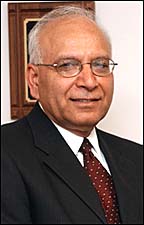 |

|

|
Aug. 15, 2003
Striking a balance between job and home
by Linda Charles
Balancing work with a
personal life can be
tough for anyone, but throw in a spouse, another career and maybe a
couple of kids, and it can seem like an impossible task. Here is how some in
the Iowa State community accomplish it.
 Kristen Constant, associate professor of materials science and engineering,
joined the Iowa State faculty in 1992. While working toward tenure, she had
two sons (in 1994 and 1996). She was awarded tenure in 1998 and had another
son the year after. Her husband, Alan, joined the faculty in materials
science and engineering in 1997 and currently is working toward tenure.
Kristen Constant, associate professor of materials science and engineering,
joined the Iowa State faculty in 1992. While working toward tenure, she had
two sons (in 1994 and 1996). She was awarded tenure in 1998 and had another
son the year after. Her husband, Alan, joined the faculty in materials
science and engineering in 1997 and currently is working toward tenure.
Red for dad. Constant keeps a color-coded "command center" at her back
door so she knows who is doing what and when.
Just say "no." "The university can swallow up your time if you let it.
I try to select carefully what I do at the university. If my presence will
make an impact, then I'll go. Otherwise, I don't."
Reserved weekends. "I try to minimize the work I do on weekends. We try
to do things as a family, like go to baseball games, and talk."
Around the clock. "The university is fairly flexible; I can work any 60
hours I want to." That translates into spending time with her family earlier
in the evening, and grading papers later that night, or staying home with a
sick child and putting the time in another day.
Pick and choose. "I finally came to the conclusion that I'm not able to
do everything to the best of my ability. I pick and choose what is
important right now."
Us time. "I go to lunch with my husband once a week."
15-love. "I just recently started playing tennis again at
lunch."
 Labh Hira, dean of the College of Business, has been with Iowa State since
1982. His wife, Tahira Hira, assistant to the president, has been at the
university since 1980.
Labh Hira, dean of the College of Business, has been with Iowa State since
1982. His wife, Tahira Hira, assistant to the president, has been at the
university since 1980.
Our friends. "We're fortunate in the sense that we work in the same
place and know the same folks." That often means having the same friends,
"which makes it easier."
Walk and talk. "We both enjoy exercise and we protect religiously our
walks together. We try to walk every night, even if we don't get home until
11. And we attend a Monday, Wednesday, Friday exercise clinic together."
A simple meal. "We both enjoy cooking and we eat out often enough for
professional reasons that we enjoy quiet time at home. We'll fix a simple
meal, like an omelet, and just enjoy each other."
One car. "We made a decision that, in our opinion, forces us to be
together. We own just one car. It's easy to become independent if you each
have a car. Having one car forces us to be together and it really works for
us."
 Marcia Anderson has been with the university 21 years, the last 15 as a
secretary in the University Marketing and Promotions Office. She has two
children (17 and 13), and her husband is the Ellsworth city superintendent.
She commutes
28 miles from Ellsworth.
Marcia Anderson has been with the university 21 years, the last 15 as a
secretary in the University Marketing and Promotions Office. She has two
children (17 and 13), and her husband is the Ellsworth city superintendent.
She commutes
28 miles from Ellsworth.
Can't miss it. "I go to as many of the kids' activities as I can. It's
a priority. I'll go to work early, work through lunch or stay late so I
don't miss the kids' events."
Team effort. "In our family, everyone pitches in to make it work." Her
daughter does the laundry and her husband frequently starts dinner.
Anderson's office organizes the university's state fair exhibit, which makes
for extra long hours. "I try to make up for working at the fair before the
fair starts. For example, I'll try to fit in a school shopping trip."
Meet and eat. The Andersons average two meals a week together, many of
them at restaurants. "We pick nicer restaurants because that's visiting time
for us."
On the road. Anderson enjoys the commute, using the time in the morning
"to get my act together" and the trip home to cast off the tensions of the
job. "I like to work, but I don't take work home, either physically or
mentally. I need to keep it separate."
Time out. "I take an afternoon or a day off for me, to get stuff done
or visit family. You have to balance your priorities and remember you're not
indispensable at work. The job will be there whether you are or not. I do a
good job at work, but it's not my
No. 1 priority. My priorities are family, friends and then
work."
 Dan Bullen, associate professor of mechanical engineering, has been with the
university 12 years. Bullen also has a presidential appointment to the U.S.
Nuclear Waste Technical Review Board, which oversees the technical efforts
of the U.S. Department of Energy on the safe shipment, storage and disposal
of high-level radioactive wastes. His work keeps him on the road a lot (he
has taken 18 trips since January). His wife works at a shop at North Grand
Mall and does contract work for movies produced in Iowa. They have four
children, ages 19, 17, 13 and 11.
Dan Bullen, associate professor of mechanical engineering, has been with the
university 12 years. Bullen also has a presidential appointment to the U.S.
Nuclear Waste Technical Review Board, which oversees the technical efforts
of the U.S. Department of Energy on the safe shipment, storage and disposal
of high-level radioactive wastes. His work keeps him on the road a lot (he
has taken 18 trips since January). His wife works at a shop at North Grand
Mall and does contract work for movies produced in Iowa. They have four
children, ages 19, 17, 13 and 11.
Make it count. Bullen said they try to make the limited time they have
together "quality time" with special events, such as the family reunion they
recently hosted.
Pencil it in. "You need to be organized and plan family time." His wife
keeps a calendar of everyone's activities. "I rely heavily on my wife."
Their best fan. "You need to show an interest in your children. You
have to make that special effort for each child." For example, Bullen
attends as many games his children are playing in as he can.
Date night. Bullen and his wife go on a date once a month. Sometimes
it's to a movie or out to eat, other times for lunch.
The big picture. "You have to determine what's important and realize
that there are aspects of your personal life that are more important than
your professional life. You have to schedule your professional and personal
lives to allow enough emphasis on both."
 Allan Schmidt, instruction development coordinator with the Instructional
Technology Center, has been with the university full time since 1989. His
wife, Ellen Rasmussen, is an assistant provost. Three years ago they adopted
a boy and a girl (both age 5 now) after serving as foster parents to one of
the children.
Allan Schmidt, instruction development coordinator with the Instructional
Technology Center, has been with the university full time since 1989. His
wife, Ellen Rasmussen, is an assistant provost. Three years ago they adopted
a boy and a girl (both age 5 now) after serving as foster parents to one of
the children.
Log on. "We've installed software on our computers so we can work from
home. After the kids go to bed, we'll log onto our computers." They use
electronic scheduling programs and PDAs. About twice a week, they go through
their schedules to make sure they have all the bases covered.
One's enough. Both Schmidt and Rasmussen try to limit themselves to one
civic or church activity. "If one of us has a committee meeting, the other
one watches the kids. If our meetings clash, then we hire a babysitter."
More Mom. Schmidt said he and his wife would like to split duties at
home 50-50, but "the kids are at an age where Mom is pretty important. She
ends up doing more with the kids and I do more with the house."
To Grandma's house. "We try to do something special on the week-ends,
like go to the gardens, the
Des Moines zoo or a water park. We also go to church together, and we
schedule time so the kids can visit their grandparents. We want the kids to
have plenty of time with them while they're in good health. And every night
we read them a book and take turns putting them to bed."
Weekend getaway. "We realized we weren't spending time together," so
now Schmidt and his wife try to get away for an occasional weekend. They
also have "date night" on the weekend and they grab lunch together when
their schedules allow.
Keep it simple. "We don't go crazy with all the activities available
for kids. We carefully choose activities for them. We also fenced in our
back yard and added a good play set and sandbox. It keeps the kids
entertained and safe, and lets us do things in the house. We include the
kids in our chores. They help unload the dish-washer or put clothes down the
clothes chute. It helps teach them to be responsible and we're doing it
together."
|

Ames, Iowa 50011, (515) 294-4111
Published by: University Relations,
online@iastate.edu
Copyright © 1995-2003, Iowa State University. All rights reserved.
|
|
 Kristen Constant, associate professor of materials science and engineering,
joined the Iowa State faculty in 1992. While working toward tenure, she had
two sons (in 1994 and 1996). She was awarded tenure in 1998 and had another
son the year after. Her husband, Alan, joined the faculty in materials
science and engineering in 1997 and currently is working toward tenure.
Kristen Constant, associate professor of materials science and engineering,
joined the Iowa State faculty in 1992. While working toward tenure, she had
two sons (in 1994 and 1996). She was awarded tenure in 1998 and had another
son the year after. Her husband, Alan, joined the faculty in materials
science and engineering in 1997 and currently is working toward tenure. Labh Hira, dean of the College of Business, has been with Iowa State since
1982. His wife, Tahira Hira, assistant to the president, has been at the
university since 1980.
Labh Hira, dean of the College of Business, has been with Iowa State since
1982. His wife, Tahira Hira, assistant to the president, has been at the
university since 1980. Marcia Anderson has been with the university 21 years, the last 15 as a
secretary in the University Marketing and Promotions Office. She has two
children (17 and 13), and her husband is the Ellsworth city superintendent.
She commutes
28 miles from Ellsworth.
Marcia Anderson has been with the university 21 years, the last 15 as a
secretary in the University Marketing and Promotions Office. She has two
children (17 and 13), and her husband is the Ellsworth city superintendent.
She commutes
28 miles from Ellsworth. Dan Bullen, associate professor of mechanical engineering, has been with the
university 12 years. Bullen also has a presidential appointment to the U.S.
Nuclear Waste Technical Review Board, which oversees the technical efforts
of the U.S. Department of Energy on the safe shipment, storage and disposal
of high-level radioactive wastes. His work keeps him on the road a lot (he
has taken 18 trips since January). His wife works at a shop at North Grand
Mall and does contract work for movies produced in Iowa. They have four
children, ages 19, 17, 13 and 11.
Dan Bullen, associate professor of mechanical engineering, has been with the
university 12 years. Bullen also has a presidential appointment to the U.S.
Nuclear Waste Technical Review Board, which oversees the technical efforts
of the U.S. Department of Energy on the safe shipment, storage and disposal
of high-level radioactive wastes. His work keeps him on the road a lot (he
has taken 18 trips since January). His wife works at a shop at North Grand
Mall and does contract work for movies produced in Iowa. They have four
children, ages 19, 17, 13 and 11. Allan Schmidt, instruction development coordinator with the Instructional
Technology Center, has been with the university full time since 1989. His
wife, Ellen Rasmussen, is an assistant provost. Three years ago they adopted
a boy and a girl (both age 5 now) after serving as foster parents to one of
the children.
Allan Schmidt, instruction development coordinator with the Instructional
Technology Center, has been with the university full time since 1989. His
wife, Ellen Rasmussen, is an assistant provost. Three years ago they adopted
a boy and a girl (both age 5 now) after serving as foster parents to one of
the children.